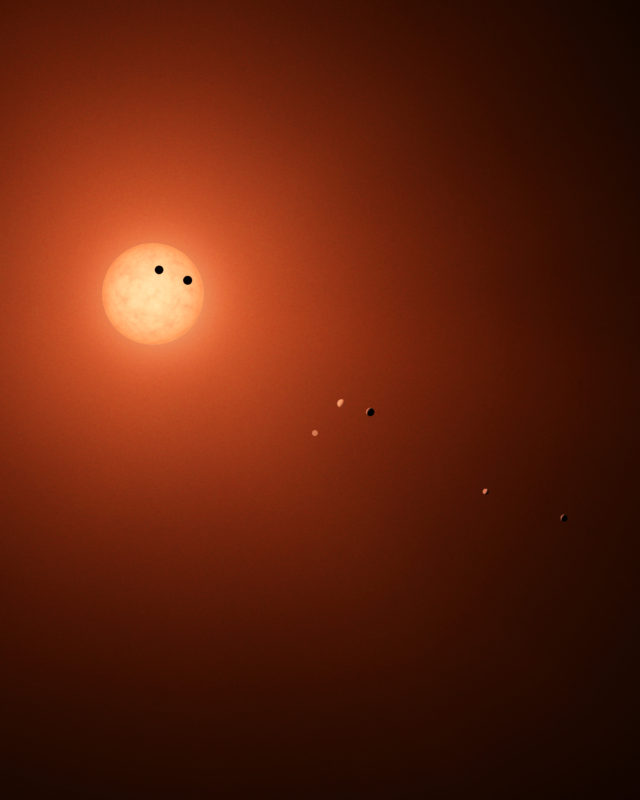March 27, 2017 8:28 pm
Tuesday, Discover TRAPPIST-1, with Emily Rice, Chuck Nice, and David Kipping
Are you ready to explore the most record-breaking exoplanet discovery in recent years?
Emily Rice is back in the StarTalk All-Stars hosting seat to explore TRAPPIST-1, the recently discovered exoplanetary system. This time, she’s joined by comic co-host Chuck Nice, and special guest David Kipping, Assistant Professor of Astronomy at Columbia University.
In case you haven’t been following the news, TRAPPIST-1 is a red dwarf star, about 40 light years away from Earth. It’s the center of the first star system ever found to have seven known Earth-size planets in orbit, three of three of which are in the habitable region known as the “Goldilocks Zone.”

An artist’s depiction of the TRAPPIST-1 system. Credit: NASA/JPL-Caltech/R. Hurt (IPAC).
You’ll hear about the discovery of TRAPPIST-1, and how the research team needed to view the system for about 500 continuous hours using the Spitzer Space Telescope to uncover multiple transits of an exoplanet moving across the face of the star, which resulted in the full discovery.
Find out why the likelihood that these exoplanets are tidally-locked is problematic for life as we know it. You’ll get details on the chances of discovering extra-terrestrial life in the TRAPPIST-1 system during our lifetime and learn why David is keen on giving a vague answer. You’ll also learn about red dwarf stars: why they are so popular amongst astronomers and astrophysicists, and why they have the capacity to survive much longer then our sun.
Our panel ponders sending radio signals towards TRAPPIST-1 and wonders if an intelligent alien civilization would be able to receive them. However, as David points out, it’s currently hard for us to detect radio leakage from even the closest star to us, so the chances aren’t high.
In my favorite part of the episode, you’ll learn about David’s hunt for exomoons, how he is using archival data from the Kepler space telescope, and the difficulties he faces when searching for these celestial objects.
All that, plus, enjoy fan-submitted Cosmic Queries throughout the episode, as well as this edition of the Lightning Round, which happens to be one of my all-time favorites.
If you want to explore TRAPPIST-1 please join us tomorrow night for Exploring TRAPPIST-1, with Emily Rice at 7pm EDT right here on our website, as well as on our new All-Stars channels on iTunes Podcasts, Google Play Music, SoundCloud, Stitcher, and TuneIn. And if you’re an All-Access subscriber, you can watch or listen to this episode ad-free at 7pm, too.
That’s it for now. Keep Looking Up!
–Ian Mullen
Get the most out of StarTalk!
Ad-Free Audio Downloads
Priority Cosmic Queries
Patreon Exclusive AMAs
Signed Books from Neil
Live Streams with Neil
Learn the Meaning of Life
...and much more

 Become a Patron
Become a Patron

